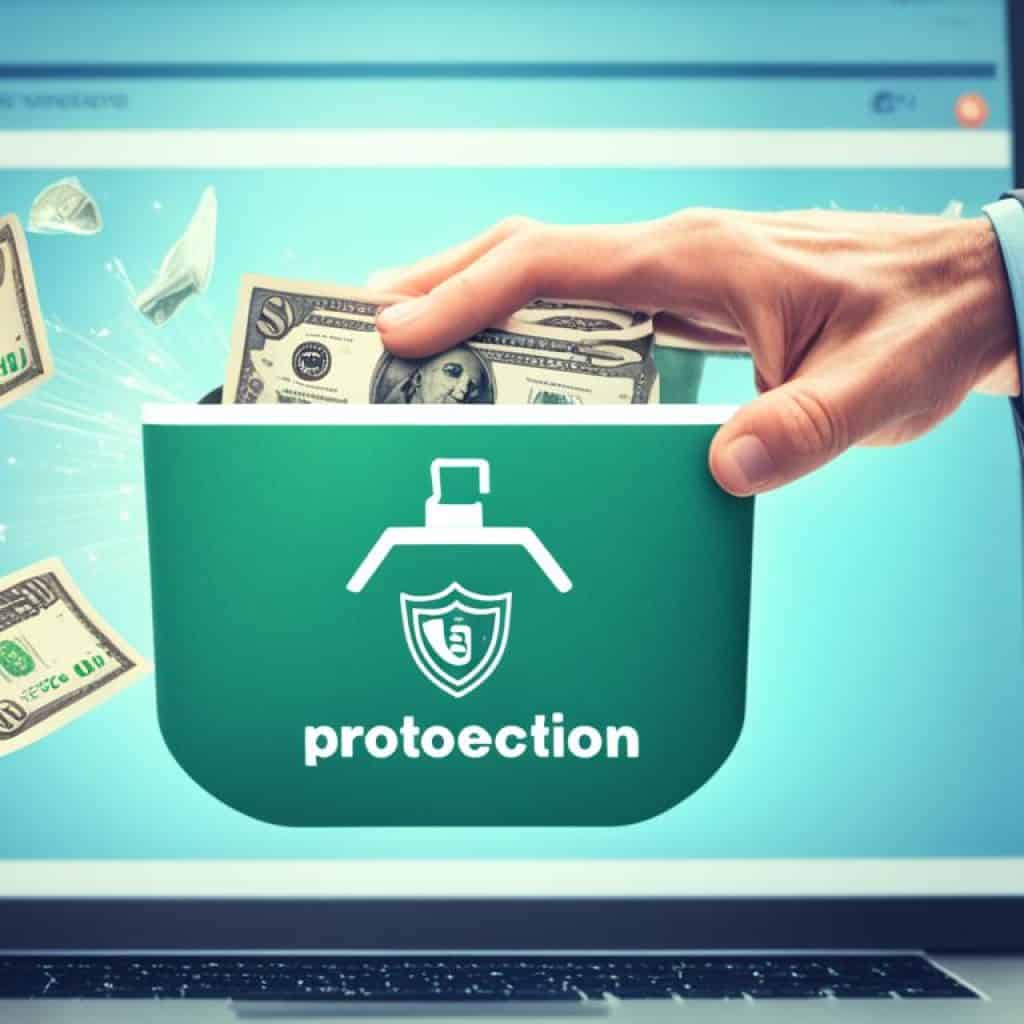Are you aware of the rising threat of email scams in the Philippines?
With the increasing prevalence of online fraud, it has become more important than ever to safeguard yourself from falling victim to these scams. By mastering the art of detection, prevention, and taking prompt action, you can effectively protect yourself against the ever-evolving landscape of email scams in the Philippines.
Key Takeaways
- Stay vigilant and aware of the various types of email fraud in the Philippines, including spam and phishing scams.
- Recognize the signs of fraudulent emails, such as design flaws, poor grammar, and unexpected requests.
- Prevent email fraud by never responding to suspicious emails or sharing personal and financial information.
- Report any email scams you encounter to authorities, helping to shut down fraudulent operations.
- Understand the impact of internet fraud and the consequences it can have on individuals and businesses.
Understanding Different Types of Email Fraud
Email fraud can take on various forms, including spam and phishing. Spam refers to unsolicited email messages that are sent in bulk, often promoting dubious products or attempting to deceive users. On the other hand, phishing scams involve the fraudulent attempt to obtain personal or financial information by posing as a trustworthy entity, such as a bank or a well-known company.
Being aware of these types of email fraud is crucial in order to protect yourself from falling victim to online scams in the Philippines, scam emails from the Philippines, and email fraud in the Philippines.
Spam Emails
Spam emails are often sent to a large number of recipients without their consent. These emails may promote fraudulent products, offer counterfeit services, or attempt to gather personal and financial information through deceptive means.
Phishing Scams
Phishing scams involve the use of fraudulent email messages or websites that mimic legitimate organizations in order to trick individuals into revealing sensitive information, such as passwords, credit card numbers, or social security numbers. These scams often create a sense of urgency or fear, urging the recipient to act quickly.
“Your account has been compromised. Click the link below to update your password immediately or your account will be suspended.”
– Sample phishing email
It is important to remain vigilant when dealing with emails from unknown senders or any suspicious requests for personal information. By understanding the different types of email fraud, you can better protect yourself from online scams in the Philippines.
| Type of Email Fraud | Description |
|---|---|
| Spam | Unsolicited email messages promoting fraudulent products or services. |
| Phishing | Fraudulent attempts to obtain personal or financial information by posing as trustworthy entities. |
Recognizing Fraudulent Emails
Fraudulent emails are becoming increasingly common, particularly in the Philippines. Scammers often try to make these emails appear legitimate by incorporating familiar company brands, colors, or legal disclaimers. However, there are several telltale signs that can help you identify a fraudulent email and protect yourself from common email scams in the Philippines.
One indicator of a fraudulent email is design flaws. These emails may have inconsistent formatting, mismatched fonts or colors, or unprofessional layouts. Poor grammar and misspellings are also red flags, as they indicate a lack of attention to detail and professionalism.
Another warning sign is a sense of urgency. Scammers often use this tactic to pressure recipients into taking immediate action. They may claim that failure to act quickly will result in severe consequences or missed opportunities. It’s important to remember that legitimate companies or organizations rarely make urgent requests via email.
Unexpected requests are another hallmark of fraudulent emails. Scammers may ask for personal or financial information, such as passwords, credit card numbers, or social security numbers, without a valid reason. Genuine companies rarely ask for this information via email, and if they do, they usually provide a secure platform for submitting such details.
Communication gaps in the email can also indicate a scam. Legitimate emails usually contain all the necessary details, including contact information and clear instructions. If the email lacks crucial information or leaves you with unanswered questions, it is likely a scam.
Deceptive links are a common tactic used in email scams. Scammers may disguise malicious links by using shortened URLs or hyperlinking text to websites that mimic legitimate ones. Always hover over links before clicking on them to check their destination. If the link seems suspicious or doesn’t match the email’s stated purpose, do not click on it.
Key Indicators of Fraudulent Emails:
- Design flaws, inconsistent formatting, or unprofessional layouts
- Poor grammar, misspellings, or language errors
- A sense of urgency and pressure to take immediate action
- Unexpected requests for personal or financial information
- Communication gaps or missing crucial details
- Deceptive links that lead to suspicious websites
By being aware of these signs of email scams, you can protect yourself from falling victim to common email scams in the Philippines. Always exercise caution when opening and interacting with emails, especially those from unfamiliar senders or those that raise any suspicion.
Preventing Email Fraud
To protect yourself from email scams in the Philippines, it is important to take proactive measures to prevent email fraud. By staying vigilant and following these tips, you can reduce the risk of falling victim to online scams.
Never respond to suspicious emails
One of the most critical steps in preventing email fraud is to never respond to or act upon emails from unknown sources that request personal or financial information. These emails often appear legitimate, but they are designed to extract sensitive data from unsuspecting victims. Be cautious and never provide any personal or financial information via email.
Be wary of suspicious emails or phone calls
Scammers may attempt to impersonate reputable companies or organizations to trick you into providing sensitive information. Always be skeptical and double-check the legitimacy of any unexpected emails or phone calls asking you to validate your UPS account information or other personal details. When in doubt, contact the company directly using an official contact number or email address to verify the authenticity of the request.
Use secure Internet browsers and keep software updated
Using secure Internet browsers that have built-in protection mechanisms can help safeguard your online activities. Additionally, regularly updating your computer’s software, including operating systems, web browsers, and antivirus programs, can prevent hackers from exploiting security vulnerabilities.
Change your passwords regularly
Changing your passwords on a regular basis is a simple but effective way to protect your online accounts from unauthorized access. Choose strong passwords that include a combination of letters, numbers, and special characters, and avoid using the same password for multiple accounts.
Equip your computer with virus protection software and firewalls
To protect against email scams and other online threats, ensure that you have up-to-date virus protection software installed on your computer. Firewalls can also add an extra layer of security by monitoring and controlling incoming and outgoing network traffic, preventing unauthorized access to your system.

Reporting Email Scams
If you encounter an email scam in the Philippines, it is crucial to report it promptly. By reporting the scam, you can help law enforcement agencies shut down fraudulent operations and prevent others from falling victim to the scam. Reporting the scam also increases awareness and allows authorities to take appropriate action against the scammers.
When reporting an email scam, provide as much detail as possible, including the sender’s email address, the content of the email, and any other relevant information. This information will assist law enforcement in their investigation and prosecution efforts. Remember, every report counts and contributes to the fight against email scams in the Philippines.
You can report email scams in the Philippines to the following authorities:
- The Philippine National Police Anti-Cybercrime Group (PNP-ACG) – contact their hotline at 1-555-5465 or send an email to ac*@*****ov.ph
- The National Bureau of Investigation Cybercrime Division – reach them at their hotline 02-852-5084 or through their email address cc*@*****ov.ph
- The Anti-Money Laundering Council (AMLC) – contact them at their telephone number 02-8523-8992 or send an email to am**@*****ov.ph
Remember, by reporting email scams, you play an essential role in safeguarding yourself and others from falling victim to these fraudulent activities. Together, we can make a difference in combating email scams in the Philippines.
| Authority | Contact Hotline | Email Address |
|---|---|---|
| The Philippine National Police Anti-Cybercrime Group (PNP-ACG) | 1-555-5465 | ac*@*****ov.ph |
| The National Bureau of Investigation Cybercrime Division | 02-852-5084 | cc*@*****ov.ph |
| The Anti-Money Laundering Council (AMLC) | 02-8523-8992 | am**@*****ov.ph |
Understanding Internet Fraud
Internet fraud encompasses a wide range of illegal activities conducted online, including identity theft, financial scams, and phishing schemes. The Philippines, like other developing countries, faces the challenge of addressing the problem of cybercrime and cyber fraud. To protect yourself and your businesses from falling victim to these scams, it is crucial to understand the nature of internet fraud.
One form of internet fraud that is prevalent in the Philippines is email phishing. Cybercriminals use deceptive emails to trick individuals into revealing sensitive information, such as passwords or credit card details. They often employ sophisticated tactics to make their emails appear trustworthy, making it challenging to spot a scam.

It is important to be cautious and vigilant when interacting with emails, especially those requesting sensitive information or urging immediate action. By being aware of the common signs of phishing emails, such as grammatical errors, suspicious attachments, and requests for personal information, you can protect yourself from falling victim to email phishing scams in the Philippines.
The Importance of Cybersecurity Awareness
“Education and awareness play a crucial role in combating internet fraud. By staying informed about the latest scams and understanding how to protect yourself online, you can reduce the risk of becoming a victim.”
In addition to email phishing, other forms of internet fraud, such as online scams and identity theft, pose significant threats. By staying informed and adopting cybersecurity best practices, such as using strong and unique passwords, keeping your software and devices up to date, and being cautious when sharing personal information online, you can minimize the risk of falling victim to Philippine cyber fraud.
Protecting Yourself and Your Business
- Implement strong security measures, including firewalls and antivirus software, to safeguard your devices and networks.
- Regularly update your software and applications to protect against known vulnerabilities.
- Exercise caution when sharing personal or financial information online, particularly on unfamiliar websites or in response to unsolicited emails.
- Be skeptical of offers that seem too good to be true and research before making any financial transactions online.
- Train yourself and your employees to recognize common signs of internet fraud, such as suspicious emails or requests for sensitive information.
By adopting these cybersecurity practices and staying vigilant, you can protect yourself and your business from Philippine cyber fraud and prevent financial loss or data breaches.
Boiler Room Scams
Boiler room scams are a type of internet investment scam that uses high-pressure sales tactics to target individuals seeking investment opportunities over the phone. Scammers employ various strategies to deceive unsuspecting victims, such as creating a sense of urgency to invest or promising unrealistically high returns with little to no effort required. Recognizing the signs of a boiler room scam is crucial in protecting yourself from becoming a victim of financial fraud.
These scams often start with a cold call from someone claiming to be a financial advisor or investment professional. They may present themselves as representatives of reputable financial institutions or organizations to gain credibility. Through persuasive language and aggressive sales techniques, scammers try to push potential victims into making impulsive investment decisions without conducting proper due diligence.
“Invest now and secure your future,” they might say, accompanied by statements like, “This opportunity is available for a limited time only.” They often emphasize the potential for high returns while downplaying the risks involved. These tactics are designed to play on your emotions and tempt you into making hasty financial decisions.”
To protect yourself from boiler room scams and internet investment fraud, it’s crucial to exercise caution and be aware of the warning signs:
Warning signs of boiler room scams:
- High-pressure sales tactics: Scammers use aggressive tactics to create a sense of urgency and persuade you to invest immediately without adequate time for research or consideration.
- Unrealistic promises: Be skeptical of offers that promise unusually high returns or minimal risk. Remember, if it sounds too good to be true, it probably is.
- Lack of transparency: Scammers often provide limited information about the investment opportunity, avoid discussing the associated risks, and may even evade your questions.
- Unregistered or unlicensed individuals or companies: Verify the credentials and registration status of the financial advisor or investment firm before engaging in any transactions.
By staying vigilant and recognizing the warning signs, you can protect yourself from falling victim to boiler room scams and internet investment fraud.
Remember, legitimate investment opportunities are based on thorough research and analysis. Always consult with licensed financial advisors and conduct your due diligence before making any investment decisions.
Romance Scams
Romance scams are a devastating form of online fraud that specifically targets individuals seeking love and companionship on dating websites. These scams are perpetrated by cunning individuals who create fake profiles, posing as potential partners to gain the trust and affection of their victims.
Using emotional manipulation and playing on the vulnerability of those searching for love, romance scammers weave intricate stories to establish a deep connection. They may shower their victims with compliments, affectionate messages, and promises of a future together.
âI felt like I had finally found my soulmate, someone who understood and cared for me. Little did I know, behind those charming words was a deceitful scammer.â – Sarah, romance scam survivor
The scammer’s ultimate goal is to exploit their victims for financial gain. They will often request money for various reasons, such as travel expenses, medical emergencies, or investment opportunities. They may even ask for personal information, such as bank account details or social security numbers, under the guise of needing it for future plans.
It is crucial to be aware of the signs of a romance scam to protect yourself from falling victim to this heart-wrenching fraud:
- Too good to be true: If someone comes across as too perfect, always consider the possibility that they may be a scammer. Genuine relationships take time to build, and no one is flawless.
- Pushing for financial assistance: Beware of individuals who quickly ask for money or financial assistance, especially if you have never met them in person. This is a significant red flag for a romance scam.
- Inconsistencies in stories: Pay attention to inconsistencies in their stories or the sudden emergence of personal crises. Scammers often use sob stories as a way to manipulate their victims into providing financial support.
- Reluctance to meet in person: If your online connection consistently avoids or postpones meeting face-to-face, it might indicate that they are not who they claim to be. Genuine individuals are usually eager to meet and spend time together to cultivate a real relationship.
By being vigilant and taking precautions, you can protect yourself from falling prey to romance scams:
- Stay skeptical: Maintain a healthy amount of skepticism, especially when interacting with someone new online. Trust should be earned gradually, not given freely.
- Guard personal information: Avoid sharing sensitive personal or financial information with anyone you have not met in person and fully trust.
- Verify their identity: Utilize reputable online resources and platforms to verify the identity and credibility of the individuals you interact with online.
- Report suspicious activity: If you suspect that you are being targeted or have fallen victim to a romance scam, report the incident to your local authorities and the dating website where you encountered the scammer.

Lottery Scams
Lottery scams are a common form of online fraud that targets individuals through fraudulent emails, letters, or text messages. Scammers deceive recipients by claiming that they have won a lottery or sweepstakes that they did not enter. These scams often exploit people’s desire for financial gain and manipulate them into providing personal information or paying fees to release the supposed winnings. It is essential to recognize the signs of a lottery scam and take precautions to protect yourself against online lottery fraud.
One key indicator of a lottery scam is when you receive notification of winning a lottery or sweepstakes that you never participated in. Additionally, scammers may use high-pressure tactics, such as creating a sense of urgency or offering limited-time opportunities to claim the winnings. It is important to remain skeptical and avoid sharing personal or financial information with unknown entities.
“Congratulations! You have won $1,000,000 in the International Lottery Sweepstakes. To claim your prize, please provide your bank account details for immediate transfer.”
Remember, legitimate lotteries or sweepstakes do not require winners to pay any fees or provide personal information upfront. If you are asked to make a payment or share sensitive details, it is a red flag for a scam.
Protecting Yourself from Lottery Scams
To safeguard yourself against lottery scams and online lottery fraud, follow these important steps:
- Be cautious of unsolicited notifications about winning a lottery or sweepstakes.
- Do not share personal or financial information with unknown individuals or organizations.
- Verify the legitimacy of the lottery or sweepstakes by contacting the official website or organization directly.
- Never send money or make payments to claim supposed winnings.
- Install up-to-date antivirus software and use spam filters to help detect and block scam emails.
By staying informed, skeptical, and vigilant, you can protect yourself from falling victim to lottery scams and online lottery fraud.
Recognizing Email Scams
In today’s digital age, it is essential to be able to recognize email scams to protect yourself from becoming a victim of online fraud. Scammers employ various tactics to deceive individuals, but by being aware of the signs of email scams, you can stay one step ahead.
One common tactic used by scammers is creating a sense of urgency. They may claim that you need to take immediate action or risk missing out on a limited-time offer. Remember, reputable companies will rarely pressure you into making hasty decisions.
Another strategy scammers use is pretending to be a trusted and well-known company. They may design their emails to mimic the branding and language of legitimate organizations. However, be cautious of poor grammar, misspelled words, or unusual requests. Legitimate companies will typically have meticulous attention to detail and professional communications.
One of the key signs of an email scam is unexpected requests for personal or financial information. Reputable institutions will not ask you to provide sensitive information via email. If you receive an email requesting such information, it’s a red flag that it may be a scam.
Here are some signs to watch out for when recognizing email scams:
- Poor grammar and misspelled words
- Unsolicited email requesting personal or financial information
- Unusual or unexpected requests
- Offers that seem too good to be true
- Unknown or suspicious sender addresses
By staying vigilant and being able to recognize the signs of email scams, you can protect yourself from falling prey to these fraudulent attempts. Remember, if something feels off or suspicious, trust your instincts and proceed with caution.
To further illustrate the importance of recognizing email scams, take a look at the table below, which highlights common signs and characteristics associated with fraudulent emails:
| Signs of Email Scams | Characteristics |
|---|---|
| Phishing attempts | Deceptive emails aiming to obtain personal or financial information |
| Sense of urgency | Creating a feeling of immediate action to pressure recipients |
| Inconsistent branding | Poorly imitated logos or designs of reputable companies |
| Unusual requests | Asking for confidential or sensitive information via email |
| Spelling and grammar errors | Poorly written emails with noticeable mistakes |
Keeping an eye out for these signs and being cautious when dealing with suspicious emails will help protect you from email scams. Remember, your online safety is in your hands.
Preventing Email Scams
In today’s digital age, protecting yourself from email scams and online fraud is of utmost importance. By taking proactive measures and staying vigilant, you can significantly reduce the risk of falling victim to these fraudulent activities.
Stay cautious and proactive
One of the key steps in preventing email scams is being cautious of emails from unknown sources that request personal or financial information. Be wary of emails that seem suspicious or urgent, especially if they ask you to provide sensitive data or make unexpected requests.
It is also essential to keep your computer and software up to date with virus protection and firewalls. Regularly installing updates and security patches can help safeguard your devices from cyber threats.
Avoid accessing confidential information on public networks
When using public Wi-Fi networks, refrain from accessing or sharing confidential information, such as your bank details or social media logins. Public networks can be vulnerable to hackers, making it easier for them to intercept your data.
Instead, use a secure and trusted network to ensure the privacy and security of your information.
Be cautious with email attachments and links
Exercise caution when opening email attachments or clicking on links, especially if they come from unfamiliar sources. Scammers often use malicious attachments or phishing links to gain unauthorized access to your personal information.
If an email includes a suspicious attachment or a link that seems questionable, it is best to avoid interacting with it. Deleting the email or reporting it as spam can help protect yourself and others from potential scams.
By following these proactive measures, you can significantly reduce the risk of falling victim to email scams and protect yourself from online fraud. Remember, staying cautious and informed is your best defense against these cyber threats.
Reporting Email Scams
Reporting email scams is a vital step in the fight against scammers and protecting others from falling victim to fraud. By promptly reporting scams to law enforcement agencies and relevant authorities, you contribute to the efforts in shutting down fraudulent operations and preventing further harm.
When reporting email scams, it is important to provide as much information as possible. Include details such as the email address, subject line, and any suspicious content or attachments. By sharing these essential details, you help investigators gather evidence and build cases against the scammers.
Additionally, reporting scams raises awareness about the dangers of email fraud. It educates others, ensuring they stay vigilant and informed, reducing the chances of individuals becoming victims.
If you encounter an email scam, do not hesitate to take action. Report it to your local law enforcement agency and relevant authorities. Together, we can combat email scams and create a safer online environment for everyone.
The Impact of Internet Fraud
Internet fraud has far-reaching consequences that affect individuals, businesses, and society as a whole. The rise of email scams and other forms of online fraud has led to significant financial loss, personal information breaches, and a breakdown of trust in digital communication. Understanding the impact of internet fraud is crucial for individuals and businesses to take proactive measures and protect themselves from falling victim to these scams.
Financial Loss
One of the most immediate and tangible consequences of internet fraud is financial loss. Scammers target unsuspecting individuals with enticing offers, false promises, and requests for money or confidential information. These scams can result in empty bank accounts, stolen credit card information, and in some cases, devastating financial ruin. Victims may find themselves unable to recover their funds or reimbursements, leaving them in a dire financial situation.
Identity Theft
Email scams often involve attempts to steal personal information, leading to identity theft. Scammers may pose as legitimate organizations or individuals, tricking victims into revealing sensitive data such as social security numbers, passwords, or financial information. Once in possession of this data, fraudsters can assume the victim’s identity, causing severe damage to their credit history, reputation, and overall well-being.
Psychological and Emotional Impact
Being a victim of internet fraud can have a significant psychological and emotional impact. Victims may feel violated, vulnerable, and fraught with anxiety. Trust in online interactions and digital transactions may diminish, making individuals hesitant to engage in online activities. The emotional toll can be long-lasting, affecting the victim’s mental health, personal relationships, and overall quality of life.
Disruption to Business Operations
Internet fraud not only affects individuals but also poses threats to businesses of all sizes. The consequences can range from financial loss due to fraudulent transactions or payment disputes to reputational damage resulting from data breaches or compromised customer information. Additionally, combating internet fraud requires businesses to invest in cybersecurity measures, diverting resources that could be used for growth and innovation.
Societal Trust and Cybersecurity
The prevalence of internet fraud undermines societal trust in digital communication and online interactions. The fear of falling victim to scams can create barriers to e-commerce, hinder the growth of the digital economy, and limit opportunities for innovation. Furthermore, addressing internet fraud requires collaborative efforts from law enforcement agencies, governments, and cybersecurity experts to develop effective preventive measures and tools.
| Consequences of Internet Fraud | Examples |
|---|---|
| Financial loss | Empty bank accounts, stolen credit card information |
| Identity theft | Assuming someone’s identity, damaging credit history |
| Psychological and emotional impact | Anxiety, feelings of vulnerability and violation |
| Disruption to business operations | Financial loss, reputational damage |
| Societal trust and cybersecurity | Undermining trust in digital communication, barriers to e-commerce |
By understanding the impact of internet fraud, individuals and businesses can take proactive steps to protect themselves, their finances, and their sensitive information. Implementing robust cybersecurity measures, educating oneself and others about common scams, and promptly reporting any suspicious activity can go a long way in mitigating the risks posed by internet fraud.
Conclusion
In conclusion, protecting yourself from Philippines Email Scam requires vigilance and awareness. By familiarizing yourself with the signs of email scams, taking proactive measures to prevent fraud, and promptly reporting any scams you encounter, you can stay safe and avoid falling victim to online fraud.
To protect against email scams in the Philippines, it is essential to be cautious when receiving unsolicited emails, especially those requesting personal or financial information. Always verify the legitimacy of the sender and be skeptical of any unexpected requests or messages that create a sense of urgency. By maintaining strong passwords, using secure Internet browsers, and keeping your devices and software up to date, you can add an extra layer of protection against email scams.
If you come across a Philippines Email Scam, it is crucial to report it promptly. By reporting the scam, you can contribute to shutting down fraudulent operations and preventing others from becoming victims. Reach out to law enforcement agencies or appropriate authorities in your country to provide them with detailed information about the scam, including the email contents and any suspicious links or attachments.
Remember, the key to protecting yourself against email scams is to stay informed, stay cautious, and stay safe online. By being vigilant and taking proactive measures to safeguard your personal and financial information, you can minimize the risk of falling prey to Philippines Email Scam and help create a safer digital environment for everyone.
FAQ
What are some common signs of a fraudulent email?
Some common signs of a fraudulent email include design flaws, poor grammar, misspellings, a sense of urgency, unexpected requests, communication gaps, and deceptive links.
How can I prevent falling victim to email scams?
To prevent falling victim to email scams, you should never respond to or act upon emails from unknown sources that request personal or financial information. Additionally, using secure internet browsers, regularly changing your passwords, and equipping your computer with virus protection software and firewalls can help protect against email scams.
What should I do if I encounter an email scam in the Philippines?
If you encounter an email scam in the Philippines, it is important to report it promptly. By reporting the scam, you can help law enforcement agencies shut down fraudulent operations and prevent others from falling victim to the scam.
What is internet fraud?
Internet fraud encompasses a wide range of illegal activities conducted online, including identity theft, financial scams, phishing schemes, and more.
What are boiler room scams?
Boiler room scams involve high-pressure sales tactics used to sell questionable investments over the phone. Scammers often target unsuspecting individuals using tactics such as creating an urgency to invest or promising high returns with minimal effort.
How can I protect myself from romance scams?
To protect yourself from romance scams, it is important to be cautious when engaging with individuals online. Be wary of requests for money or personal information, and take your time getting to know someone before trusting them.
What are lottery scams?
Lottery scams involve fraudulent emails, letters, or text messages claiming that the recipient has won a lottery or sweepstakes they did not enter. Scammers often request payment of fees or personal information to release the supposed winnings.
How can I recognize email scams?
Email scams can be recognized by signs such as poor grammar, misspelled words, unexpected requests, or a sense of urgency. Scammers may also pretend to be a reputable company or offer limited-time offers.
How can I prevent email scams?
To prevent email scams, it is important to be cautious and proactive. This includes not responding to or acting upon emails from unknown sources that request personal or financial information. Keeping your computer and software up to date and avoiding accessing confidential information on public networks can also help prevent scams.
How should I report email scams?
To report email scams, you should contact law enforcement agencies and relevant authorities, providing as much information as possible about the scam. Reporting scams helps increase awareness and enables authorities to take appropriate action against the scammers.
What are the consequences of internet fraud?
Internet fraud can lead to financial loss, identity theft, and other negative consequences. It is important to understand the impact of internet fraud to protect yourself and your businesses from falling victim to these scams.







Add comment